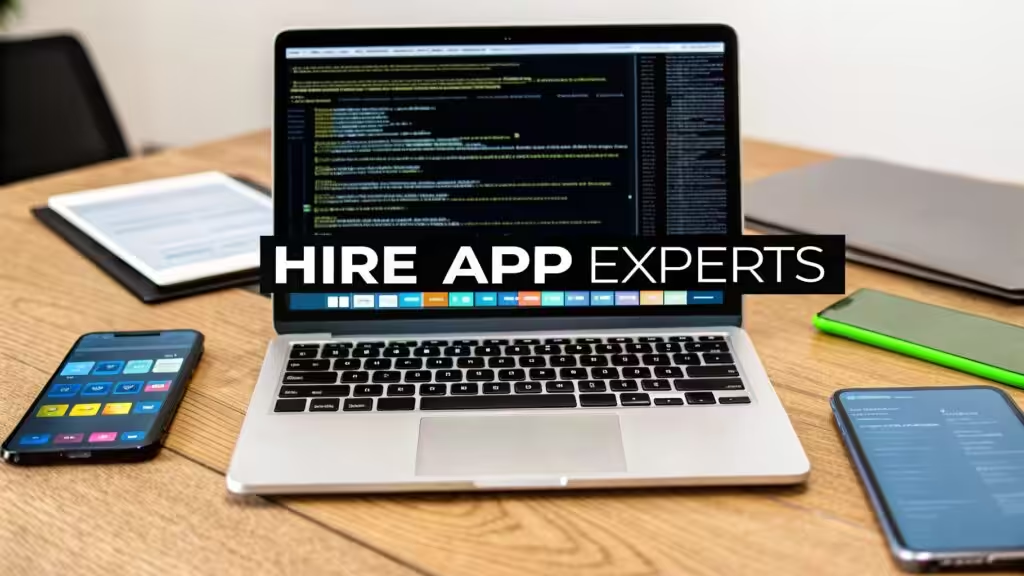Why Hiring The Right Mobile App Developers Changes Everything
Your app idea has the potential to be a game-changer. However, its success depends heavily on one critical factor: the mobile app developers you choose. Finding the right team isn’t simply about locating someone who can write code. It’s about finding partners who truly grasp your vision and can translate it into a market-leading application. It’s similar to building a house. You wouldn’t hire just any contractor to lay the foundation. You would seek out experienced architects and builders with a proven history of success. In the same way, selecting experienced and skilled mobile app developers provides a robust base for your app.

The Impact of The Right Team
The right development team brings more than just technical expertise to the project. They foster a collaborative environment, contribute innovative solutions, and ensure the final product aligns perfectly with your business goals. For instance, a team with a solid grasp of user experience (UX) and user interface (UI) design can create an app that not only functions seamlessly but also provides a delightful user experience, encouraging engagement and positive reviews. This positive user experience contributes significantly to app store rankings and, ultimately, your app’s overall success.
Furthermore, seasoned mobile app developers recognize the importance of meeting deadlines and staying within budget. They can anticipate potential challenges and proactively implement solutions, saving you both time and resources. This proactive approach is essential in a rapidly evolving industry where delays can mean missed opportunities.
The Hidden Costs of Poor Hiring
On the other hand, compromising on developer quality often leads to negative consequences. Imagine hiring inexperienced electricians to wire your new house. They might offer lower rates, but the long-term risks, such as faulty wiring and potential fire hazards, far outweigh any initial savings. The same principle applies to app development. Inexperienced developers can result in buggy code, missed deadlines, and ultimately, a subpar product that fails to meet user expectations.
The demand for mobile app developers has been consistently rising, fueled by the increasing number of smartphone users worldwide. Currently, over 7.26 billion people use smartphones, creating a significant demand for innovative and engaging mobile applications. This trend is expected to continue, with mobile app revenue projected to hit $613 billion by 2025. This growth highlights the essential role mobile apps play in today’s tech world. Find more detailed statistics here: Learn more about app development statistics. This high level of competition means your app needs a strong foundation of high-quality code, which only skilled and experienced developers can provide.
The Bottom Line
Choosing the right mobile app developers is a strategic investment in your app’s future. It’s about finding a team that not only builds an app but also helps you build a successful business. This involves prioritizing experience, expertise, and a deep understanding of your vision. By making informed hiring decisions, you’ll be well-equipped to take advantage of the expanding mobile app market and achieve your business objectives.
Essential Skills That Separate Great Developers From Average Ones
When hiring mobile app developers, a polished portfolio and a resume filled with technical jargon aren’t enough. The true measure of a developer’s worth lies in the right combination of hard skills and soft skills that directly impact a project’s success. This is particularly important in the competitive field of mobile app development. It’s similar to hiring a chef: anyone can claim to cook, but a truly great chef possesses a blend of technical culinary skills and the creativity to craft an exceptional dining experience.
Technical Proficiency: Beyond the Buzzwords
Technical skills are, of course, fundamental. However, understanding the nuances of different platforms is where exceptional developers stand out. Do you need a dedicated iOS developer fluent in Swift and Objective-C? Or perhaps an Android expert proficient in Java and Kotlin? A cross-platform approach using frameworks like React Native or Flutter may be a better fit for your budget and timeline.
Even within each platform, specialized skills vary. A developer specializing in mobile games needs experience with graphics rendering and game engines, while an e-commerce app developer should understand secure payment integrations and API management. These specific skills make them specialists for particular types of development.
To illustrate the different skill sets needed, let’s look at the following comparison:
To help illustrate the key technical skills required for each development type, the table below provides a quick comparison guide.
Essential Technical Skills Comparison:
Comparison of required technical skills for different types of mobile app development projects
| Skill Category | iOS Development | Android Development | Cross-Platform | Priority Level |
|---|---|---|---|---|
| Programming Languages | Swift, Objective-C | Java, Kotlin | JavaScript, Dart | High |
| Platform SDKs | iOS SDK | Android SDK | Flutter SDK, React Native SDK | High |
| UI/UX Design | UIKit, SwiftUI | Android UI, Jetpack Compose | Platform-specific UI or Cross-Platform UI libraries | High |
| API Integration | RESTful APIs, JSON | RESTful APIs, JSON | RESTful APIs, JSON | High |
| Data Management | Core Data, Realm | SQLite, Room | Platform-specific or Cross-Platform Database solutions | Medium |
| Testing | XCTest, Appium | JUnit, Espresso | Platform-specific testing frameworks or Cross-Platform solutions | Medium |
| Version Control | Git | Git | Git | High |
Key Insights: While all development types require proficiency in API integration and version control, the specific programming languages and SDKs differ. Cross-platform development often prioritizes JavaScript or Dart, while native development focuses on platform-specific languages like Swift, Objective-C, Java, and Kotlin.
Problem-Solving Prowess: Thinking Beyond Code
While technical skills are essential, exceptional mobile app developers are also excellent problem-solvers. They can analyze complex issues, break them down into smaller parts, and develop effective solutions. This involves more than just writing code—it requires critical thinking about the impact of each decision and anticipating potential challenges. This foresight can prevent costly mistakes and project delays.
For example, if an app feature isn’t working as expected, an average developer might just tweak the code until it seems to function. A great developer investigates the root cause, considers the potential side effects, and implements a comprehensive solution. They consider the feature’s impact on other parts of the code, user experience, and future updates.
Communication: Bridging the Gap Between Tech and Business
Finally, never underestimate the value of strong communication skills. Your developers should clearly explain technical concepts to non-technical stakeholders, actively listen to your feedback, and proactively address any concerns. This open communication keeps everyone informed, preventing misunderstandings and creating a collaborative environment.
A developer who can’t clearly explain progress or challenges can create confusion and potentially derail the project. This clear and proactive communication is a defining characteristic of a top-tier developer. Remember, they’re not just building code; they’re building your vision.
Uncovering Hidden Talent Pools Where Top Developers Actually Work
Finding qualified mobile app developers can be a real challenge. Generic job boards are often overflowing with applications, making the process of identifying truly exceptional talent incredibly time-consuming. Instead of relying on these overcrowded platforms, consider exploring the hidden talent pools where top mobile app developers invest their time.
Exploring Niche Communities and Platforms
Highly skilled developers frequently engage within specialized online communities, contributing to open-source projects and participating in technical discussions. Platforms like GitHub, Stack Overflow, and niche forums dedicated to specific programming languages (such as Swift for iOS development or Kotlin for Android development) can be invaluable resources. These platforms provide insights into a developer’s actual code contributions and problem-solving abilities, offering a more accurate assessment of their skills compared to a traditional resume. Furthermore, attending industry-specific conferences and online events can be a great way to network and connect directly with talented individuals.
You might be interested in: Nearshore IT Staffing.
Understanding Developer Motivations
It’s important to recognize that the most talented developers aren’t always actively searching for new positions. They’re often deeply engaged in challenging projects and may not be visible on traditional job boards. Therefore, a proactive approach to your search is crucial. Reaching out directly to developers whose work you admire, even if they aren’t actively seeking new opportunities, can be a highly effective strategy. Emphasizing the exciting aspects of your project and the opportunity to contribute to something meaningful can be significantly more compelling than a standard job posting.
Comparing Hiring Approaches
Several approaches exist for hiring mobile app developers, each with its own set of advantages and disadvantages.
- Freelance Platforms: These platforms provide access to a large pool of developers, often at competitive rates. However, managing multiple freelancers can be complex, and maintaining consistent quality can be difficult.
- Development Agencies: Agencies offer dedicated teams of developers with project management expertise, providing a more structured approach. However, agency fees can be substantially higher than hiring individual freelancers.
- Direct Hiring: Directly hiring in-house developers offers greater control and fosters a stronger team culture. This approach involves significant overhead costs, including salaries, benefits, and equipment. The global mobile app download numbers are a strong indicator of the increasing demand for mobile app developers. Mobile app downloads are projected to reach over 300 billion by 2025, highlighting the growing importance of mobile applications in everyday life. Learn more about mobile app downloads here: App Development Career 2025.
Ultimately, the most suitable approach depends on your specific project requirements, budget, and long-term objectives. Factors such as project complexity, timeline, and the level of control you need should be considered when making your decision. By exploring these hidden talent pools and understanding developer motivations, you’ll be better positioned to find the perfect team to bring your mobile app vision to life.

Evaluation Strategies That Reveal True Developer Capabilities
Finding the right mobile app developer can be a challenge. Anyone can present a polished portfolio, but true technical skill and problem-solving abilities often lie beneath the surface. Just as a musician’s performance of a single piece doesn’t reveal their ability to improvise or collaborate, a visually appealing app doesn’t necessarily demonstrate a developer’s capacity to handle real-world project complexities. Therefore, a more strategic approach to evaluation is essential.
Designing Practical Coding Challenges
Move beyond abstract algorithmic puzzles and present candidates with practical coding challenges. These challenges should mirror the types of tasks they would encounter in your actual project. For example, if you’re developing an e-commerce app, ask the developer to build a simplified product page. This practical exercise reveals far more about their skills than simply asking them to describe how they might build such a feature. Observing their approach to a real-world scenario allows you to assess not only their coding proficiency but also their problem-solving skills and ability to apply their knowledge in practical contexts.
Conducting Meaningful Portfolio Reviews
Don’t just admire the aesthetics of a developer’s portfolio; delve deeper. Ask pointed questions about their specific contributions to each project. What challenges did they face? What decisions did they make, and why? Understanding their role and the reasoning behind their choices reveals much more about their individual capabilities, their understanding of the development lifecycle, and their ability to navigate obstacles. A candidate who can articulate their thought process and demonstrate a deep understanding of their past work is far more valuable than one who simply presents visually appealing projects without being able to explain the underlying logic.
Structuring Insightful Conversations
The interview process should assess both technical competence and cultural fit. Incorporate behavioral questions alongside technical inquiries. Ask about past experiences and work styles. Questions like, “Tell me about a time you faced a difficult technical challenge and how you addressed it” or “Describe your preferred way of collaborating within a team” offer valuable insights. These conversations often uncover potential red flags, such as a tendency to work in isolation or difficulty adapting to changing project requirements, which could predict future problems.
Implementing Objective Scoring Methods
Finally, use objective scoring methods to compare candidates fairly. Develop a rubric with specific criteria, such as proficiency in relevant programming languages like Java, Kotlin, or Swift, experience with Agile methodologies, communication skills, and problem-solving abilities. This structured approach, based on quantifiable metrics, allows you to make data-driven hiring decisions, minimizing reliance on subjective impressions and maximizing the chances of finding developers who will truly contribute to your project’s success. Hiring the right mobile app developers requires a thoughtful, systematic evaluation process. By implementing these strategies, you can identify candidates who possess the true capabilities needed to bring your mobile app vision to life.
Smart Budgeting: Understanding Real Developer Costs
Navigating developer pricing involves more than just comparing hourly rates or project quotes. Accurately budgeting for your mobile app requires understanding the various factors influencing the overall cost. Think of it as similar to planning a construction project – the initial quote rarely reflects the final price. Additional expenses always arise, such as materials, permits, and unforeseen issues during the process. Hiring mobile app developers also involves several layers of costs.
Key Cost Factors To Consider
Several elements contribute to the final cost of hiring mobile app developers. Developer experience is one key factor. Senior developers, possessing a deep understanding of various technologies and platforms, command higher rates than junior developers. Just as medical specialists charge more than general practitioners, experienced developers bring specialized knowledge and efficiency.
Another factor is the complexity of your app. An app with basic features will naturally cost less to develop than one requiring complex integrations, real-time data processing, or advanced functionalities like augmented reality. This difference is comparable to the cost disparity between building a simple shed and a multi-story house.
The target platform also plays a role. Developing for iOS, Android, or both impacts the cost. Each platform has its own development environment, programming languages (like Swift for iOS and Kotlin for Android), and testing procedures. Developing for both platforms often necessitates hiring developers specializing in each, increasing the overall expense.
Evaluating Different Engagement Models
When hiring mobile app developers, you’ll encounter various engagement models, each with different cost implications. Hiring freelancers is one common model. This offers flexibility and potentially lower costs, particularly for smaller projects. However, managing multiple freelancers can be challenging, requiring more project oversight.
Alternatively, you can hire a dedicated development team. This provides a more structured approach, often including project management. Agencies offer this model, providing access to a team of specialists, but at a higher price point. It’s like choosing between hiring individual contractors for your house renovation versus a full-service renovation company.
Finally, hiring in-house developers offers the most control and fosters a stronger company culture, but comes with significant overhead, including salaries, benefits, and equipment.
To understand the differences between these models better, let’s take a look at the following comparison:
Developer Pricing Models Comparison
Comprehensive breakdown of different pricing models and their suitability for various project types.
| Pricing Model | Best For | Average Cost Range | Pros | Cons |
|---|---|---|---|---|
| Freelancers | Small projects, specific tasks, limited budgets | $25-$150/hour | Flexibility, potentially lower cost | Management overhead, potential communication challenges |
| Dedicated Development Team (Agency) | Medium to large projects, complex features, need for project management | $50-$200/hour | Structured approach, access to specialists | Higher cost than freelancers |
| In-House Developers | Long-term projects, continuous development, strong company culture | $60,000-$150,000/year + benefits | Most control, direct communication | Highest overhead, recruitment effort |
This table summarizes the key aspects of each pricing model, allowing you to make an informed decision based on your project’s needs and budget. Choosing the right engagement model is critical for project success and efficient budget allocation.
Unveiling Hidden Costs
Beyond the upfront costs, several hidden expenses can impact your budget. Onboarding new developers requires time and resources for training and integration. Software licenses and specialized tools also add to the expense. Finally, potential rework due to changing requirements or unforeseen technical challenges can significantly inflate the final cost.
Negotiating Smartly
Effective negotiation can help you secure the best value while attracting top talent. Clearly defining your project scope, setting realistic milestones, and establishing a transparent communication process helps avoid misunderstandings and costly revisions. Just as a well-defined construction blueprint prevents costly rework, a detailed project specification minimizes unexpected expenses in app development.
By understanding these factors and employing smart budgeting strategies, you can effectively manage your investment and hire mobile app developers who deliver exceptional results within your budget.
Leading Your Development Team to Exceptional Results
Hiring skilled mobile app developers is just the first step. Transforming their talent into a successful project requires effective leadership, strategic planning, and clear communication. Just as a conductor guides musicians to create a symphony, a project leader must orchestrate their development team’s efforts. This involves understanding the nuances of managing technical teams and nurturing a collaborative environment.
Onboarding for Success: Setting the Stage
Effective onboarding is critical for integrating new developers into your team and project. Provide comprehensive documentation outlining project goals, technical specifications, and established workflows. This upfront investment saves time and prevents misunderstandings later.
A well-structured onboarding process might include:
- Introductory meetings with key stakeholders
- Access to relevant Git repositories
- A clearly defined roadmap for the first few weeks.
This ensures everyone is aligned from the outset.
Milestone Management: Keeping Projects on Track
Divide the project into manageable milestones with defined deliverables and deadlines. This approach keeps the team focused, facilitates progress tracking, and provides regular opportunities for feedback and adjustments. Milestones create a sense of accomplishment and maintain forward momentum.
Navigating Scope Adjustments: Adapting to Change
Project requirements often change. Establish a process for handling scope adjustments, including clear communication, impact assessments, and updated timelines. This prevents scope creep, maintains budget control, and minimizes disruptions. Careful planning and communication are key to navigating these changes effectively.
Managing Timeline Pressures: Maintaining Momentum
Timeline pressures are unavoidable. Implement strategies to mitigate delays, such as prioritizing critical tasks, allocating resources strategically, and maintaining open communication with stakeholders. Learn more in our article about the benefits of hiring Latin American remote workers. This transparency builds trust and enables informed decision-making.
Quality Assurance: Ensuring Excellence
Maintaining high quality standards is paramount. Implement regular code reviews, thorough testing procedures, and clear bug reporting mechanisms. This proactive approach prevents costly rework, ensures a polished end product, and cultivates a culture of excellence. Consistent quality control is essential for delivering a superior product.
Effective Communication: The Key to Collaboration
Open and frequent communication is fundamental. Establish clear communication channels, schedule regular team meetings, and actively encourage feedback. This prevents misunderstandings, fosters collaboration, and keeps everyone informed about project progress. Open communication builds trust and empowers the team to overcome challenges together.
Building Long-Term Partnerships: Investing in the Future
Successful projects often pave the way for ongoing collaborations. Cultivate long-term partnerships with your development team by providing opportunities for professional growth, recognizing individual contributions, and maintaining open communication. This investment strengthens the foundation for future projects, streamlines onboarding, and cultivates a shared sense of accomplishment. Nurturing these relationships builds a valuable network of skilled developers who understand your business objectives and work style. By implementing these leadership and management strategies, you can empower your mobile app developers to deliver exceptional results and contribute to the enduring success of your projects.
Key Takeaways
Your journey to hiring mobile app developers who truly deliver starts with understanding the key elements of a successful partnership. This section offers practical insights and actionable steps, guiding you through the process, from crafting compelling job descriptions to building lasting relationships with developers integral to your app’s success.
Defining Your Project Scope and Requirements
Before starting the hiring process, clearly define your project scope. Just as an architect needs blueprints, you need a detailed roadmap outlining your app’s functionality, target audience, and technical specifications. This includes:
- Core Features: List the essential functions of your app.
- Target Platforms: Specify your need for iOS, Android, or cross-platform development.
- Technical Specifications: Detail the necessary technologies, APIs, and frameworks.
A well-defined scope clarifies your needs and attracts developers with the right expertise. This initial planning sets the stage for efficient communication and realistic budget estimations.
Identifying the Right Talent Pool
Knowing where to find skilled mobile app developers is crucial. Explore niche platforms like GitHub and Stack Overflow, where developers showcase their code and participate in technical discussions. Consider attending industry conferences and joining online communities to network and connect with potential candidates. Consider these options:
- Freelance Platforms: Access a broad range of developers, often at competitive rates.
- Development Agencies: Utilize dedicated teams with project management expertise, typically at a higher cost.
- Direct Hiring: Gain the greatest control and foster a stronger team culture, but expect overhead costs like salaries and benefits.
The right talent pool depends on your project’s needs, budget, and long-term goals.
Evaluating Developer Capabilities
Go beyond resumes and portfolios. Implement practical evaluation strategies. Design coding challenges mirroring real project scenarios to assess problem-solving skills and technical proficiency. Conduct meaningful portfolio reviews, exploring the developer’s specific contributions and decision-making process for each project. Effective evaluation includes:
- Technical Interviews: Assess proficiency in relevant programming languages and frameworks.
- Behavioral Questions: Gauge communication, work style, and cultural fit.
- Objective Scoring: Employ a rubric to compare candidates fairly based on predefined criteria.
Thorough assessments provide a more accurate picture of a developer’s abilities.
Budgeting Wisely and Managing Costs
Understanding the true cost of hiring goes beyond hourly rates or project quotes. Consider factors like developer experience, project complexity, and the target platform. Different engagement models offer various cost structures:
- Hourly Contracts: Provide flexibility but require careful time tracking.
- Fixed-Price Projects: Offer predictable costs but need a well-defined scope.
- Dedicated Teams: Offer a structured approach but may have higher overall fees.
Account for additional costs like onboarding, software licenses, and potential rework. Negotiate transparently and establish clear payment terms.
Leading Your Development Team to Success
Effective leadership transforms developer expertise into tangible results. Implement strategies for successful team management:
- Onboarding: Provide comprehensive documentation and training for seamless integration.
- Milestone Management: Break down the project into manageable phases with clear deadlines.
- Communication: Establish clear communication channels and encourage regular feedback.
Prioritizing clear communication, proactive problem-solving, and a collaborative approach empowers your developers to achieve exceptional results.
Ready to build your dream team? Nearshore Business Solutions connects you with top-tier remote talent across Latin America. We handle hiring, onboarding, and ongoing management, allowing you to focus on building a successful app. Start building your remote team today.

